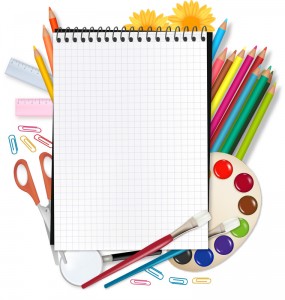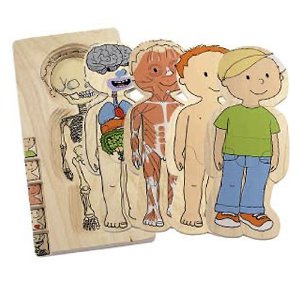Back to School Bonus Issue: And check out our new list of Science Recommendations!
Published: Thu, 08/30/12
Note from Rachel DeMille: I put this out last year, and thought it might be of use to some of our newer subscribers - or perhaps for a second read to those who've already seen it. Take note of the new, expanded and totally awesome list of science resources!!
Featured Article:
Back-to-School Shopping List, Part I
Content overview:
- Mentor Advisory: You're the expert!
- To borrow or to buy?
- Old-fashioned vs. New-fangled
- Top Picks
- The classics are great for literature. But what about Math & Science?
1. MENTOR ADVISORY: Whenever you encounter a talented expert giving you step-by-step recommendations, you might sometimes find that there is more "guidance" than you need or should use.
Please utilize these recommended resources (and any other systems, lesson plans or resources you find anywhere) with care!
- Do customize their content and processes so that they serve your needs.
- Don't find yourself in a situation where you and your students are marching to the orders of a book or "expert".
If you keep the 7 Keys of Great Teaching in mind, you will find yourself picking and choosing, personalizing and passing things up, as you respect yourself as the master teacher that you are becoming, and address the individual needs of your students.
Remember: You're the expert. And above all: Inspire!
2. To Borrow or to Buy?
The question inevitably arises regarding which resources you should purchase, and which are best to borrow from a library or friend. The answer will differ, depending on your budget, storage space, the number of kids you have (think in terms of handing resources down), where you live, etc.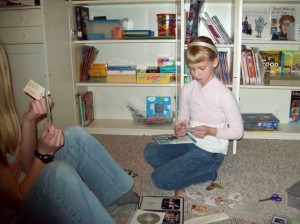
- A folk guitar, excellent condition but for one broken string: $5
- A weight/number line system (like I used in grade school!): $2
- Art supplies galore (sketch pads, paints, brushes, colored pencils, full apple box of stencils, full apple box of scrapbooking pages, etc., etc.) @$15
- Magazine organizers (great for keeping each kid's shelf tidy): a full apple box for $2
- Discovery Toys Writing game: $.50
- Little Tikes hutch for expanding the younger kids' shelves (a perfect match for their existing shelf!): $10
- Expanding alpha-tabbed file for keeping printables organized: free
3. Traditional or Cutting Edge?
More and more families are utilizing technology in their learning, and I'm finding that the newest generation of offerings has some great stuff for those who are so inclined. The old-fashioned way still works like a charm--and I've got some tried-and true suggestions here. The new-fashioned way will also appeal to many, and I've included some more tech-based suggestions as well.
Don't try to make something work that's not right for you and your goals. At the same time, let's all celebrate that there are so many wonderful things for each of us to choose from. You might find that something that didn't seem like it applied to you before could be just the right thing for now...
4. Some Top Picks:*
 This Week in History This TJEd-friendly online resource takes you on rabbit trails that cover everything from language skills to music, geography, anatomy, foreign language, cooking, science, math and more - in a way that includes all ages and levels of interest and aptitude. Ready-to-go and easily incorporated in any style. (See reviews at the end of this article)
This Week in History This TJEd-friendly online resource takes you on rabbit trails that cover everything from language skills to music, geography, anatomy, foreign language, cooking, science, math and more - in a way that includes all ages and levels of interest and aptitude. Ready-to-go and easily incorporated in any style. (See reviews at the end of this article)
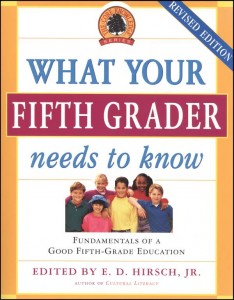 The Core Knowledge Series
by E.D. Hirsch
Get them one at a time if you must, but you'll never be sorry to have
this at your fingertips! I like to read with my kids and--as Diann
Jeppson describes in A Thomas Jefferson Education Home Companion--put the each one's initials next to the content I've covered with them.
The Core Knowledge Series
by E.D. Hirsch
Get them one at a time if you must, but you'll never be sorry to have
this at your fingertips! I like to read with my kids and--as Diann
Jeppson describes in A Thomas Jefferson Education Home Companion--put the each one's initials next to the content I've covered with them.
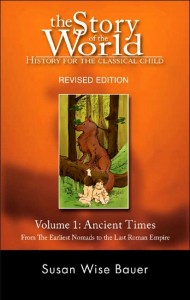 The Story of the World Series by Susan Wise Bauer
These stories are about the best thing going for listening at bedtime or in the car. They straddle the line nicely between great storytelling and conveyance of lots of information. And they lead to wonderful discussions - so keep your finger poised to hit the "pause" button and take your time going through them!
The Story of the World Series by Susan Wise Bauer
These stories are about the best thing going for listening at bedtime or in the car. They straddle the line nicely between great storytelling and conveyance of lots of information. And they lead to wonderful discussions - so keep your finger poised to hit the "pause" button and take your time going through them!
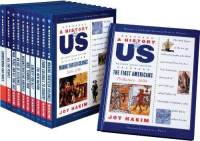
- The History of US by Joy Hakim (for me, these are better for older Love of learning and Transition to Scholar/Scholar) They have these at our library, and I'm not yet certain whether I want to own them, but I'm loving them at the moment. I read to the kids while their hands are busy -- even while my 14yo daughter is doing math right beside us and the others are playing Memory. (Remember, some kids actually thrive on multiple activities at once; I do!)
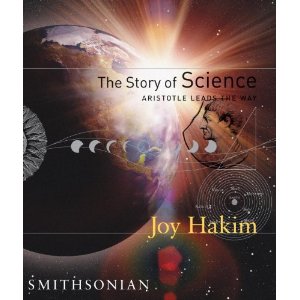
- The Story of Science by Joy Hakim (I would stick to the main books, and not the student guides and teacher supplements) Cool content I'm just now exploring, and really thrilled about! I love her style of writing. I do think it's a book to either read with/to the kids, or for sure to discuss along the way, being familiar with what is presented, so that you can clarify how science, philosophy, history and religion developed together, and help your kids make sense of questions as they arise.
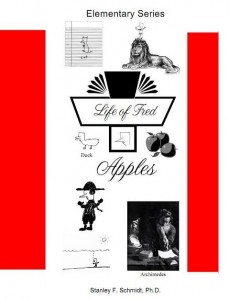
- The Life of Fred by Stanley Schmidt (Now available with new primer level stories: Apples, Butterflies, etc. Love them for reading with the kids!!) Stanley Schmidt is insanely brilliant in the way he presents his material. It reminds me of the way I teach Hebrew--but I would never have thought you could be so random, creative and abstract while teaching math! These are a little pricey and tough to find in a lending library, but they are absolutely built to last. I will be using these with multiple kids and keeping them around to use with my grandkids as well. Very happy with this purchase.
5. What about Math and Science?
The study of math has lost its soul in the past century. We have become so obsessed with our comparative lack of math proficiency that we have over-compensated on the side of learning skills without drawing meaning from the study of math. It was not always so: In ancient times math was strongly tied to music, philosophy and other "practical" pursuits.
The net result of this lack of vision is that today's learners (and teachers!) are uninspired to explore math; they believe they are no good at math, and ultimately, that math has nothing to do with anything they care about. Thank goodness for a surge of great resources, with an ever-expanding field, to help today's learners with the elegance and titillation of mathematical study. We are relearning the language of math in the 21st century!
Inspirational Math
For some homeschoolers, teaching math and science is the greatest worry. As TJEders, those of us who aren't math-inclined find this especially challenging: how do you "Inspire and not Require" when you don't like math? How do you use "Classics, not Textbooks"? An omigoodness, what of "You, not Them" in math studies? Must I really???
Never fear. As with everything else, your change of heart and new-found inspiration in math (suggestions to discover this new-found inspiration follow below...) will infuse your home and classroom with a dynamic and enthusiastic Love of Learning that leads to a successful Scholar-approach to mathematics.
Math Resources On TJEd.org:
- List of Math Classics for Adults (pdf download with live links available here)
- List of Math Classics for Kids (pdf download with live links available here)
- "Living Math"
- "What's Math Got To Do With It?"
- See also the Living Math Yahoo Group
Must-reads for parents struggling to teach math
(I recommend you read them in the order they appear here)1. Math Doesn't Suck by Danica McKellar
 Not only does this popular actress/professional mathematician help you brush up on your skills, but her teaching style will help you get a feel for how to innovate on math principles, and how to use teach them in fun and relevant ways. Easily incorporated into anyone's style. My kids love these!
Not only does this popular actress/professional mathematician help you brush up on your skills, but her teaching style will help you get a feel for how to innovate on math principles, and how to use teach them in fun and relevant ways. Easily incorporated into anyone's style. My kids love these!
I especially like that her teaching style promotes mathematical thinking. Too often kids (and even teachers) who seem to be successful in getting the right answers to equations don't really grasp why it is how it is. They go through the motions without being moved by the bigger picture of how it relates to the wide world of knowledge! They deceptively excel at testing without ever becoming fluent the language of math.
This book coaches you on how to bring the principles into real-life focus, and does so in an entertaining and empowering way. There are two follow-up books in this series that are also worth your time if this book hits the sweet spot for you: Kiss My Math: Showing Pre-Algebra Who's Boss, and Hot X: Algebra Exposed. (Don't let the titles fool you; they're the sassiest thing about these books, which are really quite sweet.)
2. The Secrets of Mental Math by Arthur Benjamin
 I used this as a text for a class I taught, and some of the students who had previously been "math challenged" spent hours enthusiastically teaching and sharing their new-found genius in things mathematical!
I used this as a text for a class I taught, and some of the students who had previously been "math challenged" spent hours enthusiastically teaching and sharing their new-found genius in things mathematical!
Off-beat and inspiring, this one can not only empower the math-enabled parent or kid to new levels of prowess, but can reveal the undiscovered brilliance in students and parents who've missed the math boat in previous attempts. Highly recommended!
3. The Mathematical Universe by William Dunham
 Unique in its approach; this book takes random concepts, events and personalities in the realm of mathematics and presents them according to alphabetical order. This seemingly chaotic treatment actually ends up being both accessible to the math-insecure and elevating to the math lover.
Unique in its approach; this book takes random concepts, events and personalities in the realm of mathematics and presents them according to alphabetical order. This seemingly chaotic treatment actually ends up being both accessible to the math-insecure and elevating to the math lover.
Elegant and eclectic, this book led me to many moments of pondering on mathematical concepts, which I had not been prone to do previously. Much inspiration comes from reading this book slowly and considering how to share what you've learned with others!
4. The Beginner's Guide to Constructing the Universe by Michael Schneider
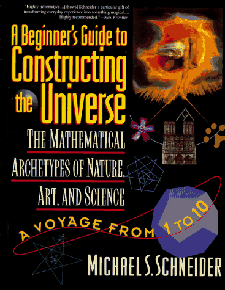 I haven't actually started this one yet; it's next on my docket. But Oliver tells me it's indispensable on this list, and I have to say that merely reading the subtitle makes me feel a little giddy: "The Mathematical Archetypes of Nature, Art and Science - A Voyage from 1 to 10".
I haven't actually started this one yet; it's next on my docket. But Oliver tells me it's indispensable on this list, and I have to say that merely reading the subtitle makes me feel a little giddy: "The Mathematical Archetypes of Nature, Art and Science - A Voyage from 1 to 10".
I LOVE, LOVE, LOVE writers who are able to connect things from one discipline or area of study to another. This is what we too often missed in conveyor belt learning, and the thing that helps us achieve brilliance as we get off the conveyor belt. I can't wait to read it and be mentored by this mind!
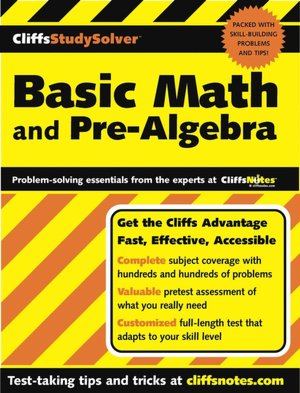 This is my go-to book to fill in gaps (whether for the teacher or the student) in basic math skills and operations.
This is my go-to book to fill in gaps (whether for the teacher or the student) in basic math skills and operations. Math Toys and Games
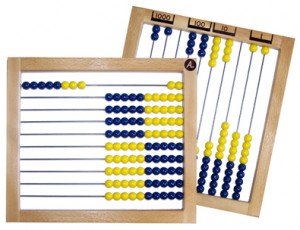 AbacusHaving abacus on hand is the ultimate in simplicity for teaching number and place values, carrying, borrowing, number grouping and basic (and even more advanced) operations.
AbacusHaving abacus on hand is the ultimate in simplicity for teaching number and place values, carrying, borrowing, number grouping and basic (and even more advanced) operations.
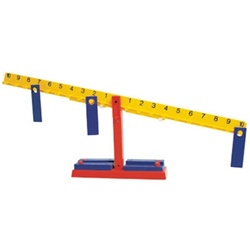 Number balance
I love this toy because it helps to reveal number values, help with understanding of the number line, negative numbers, additive inverses, the associative principle of addition, the relationship between factors and products, etc. (If these terms are greek to you, try the
Number balance
I love this toy because it helps to reveal number values, help with understanding of the number line, negative numbers, additive inverses, the associative principle of addition, the relationship between factors and products, etc. (If these terms are greek to you, try the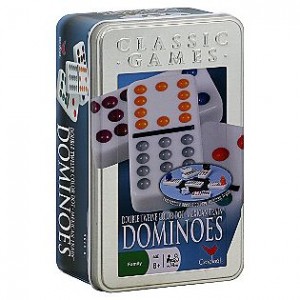 Dominos
Sooo many great games and learning activities are facilitated by a nice set of dominos! Number grouping, equivalents, less/greater than, simple quantity recognition, etc. Plus, who doesn't like a good game of chicken foot?
Dominos
Sooo many great games and learning activities are facilitated by a nice set of dominos! Number grouping, equivalents, less/greater than, simple quantity recognition, etc. Plus, who doesn't like a good game of chicken foot?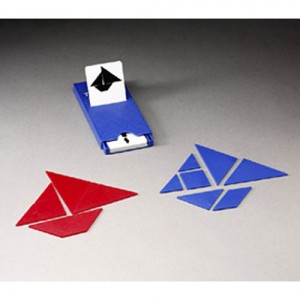 Tangrams are a learning tool that combines artistic and mathematical elements to enhance visual perception ability, develop problem solving skills, creative thinking capacity and teamwork. The classic tangram forms a square. The 7 pieces can also form an infinite number of abstract designs, human figures, animals and everyday objects. The object is to form the image on the card using all seven puzzle pieces.
Tangrams are a learning tool that combines artistic and mathematical elements to enhance visual perception ability, develop problem solving skills, creative thinking capacity and teamwork. The classic tangram forms a square. The 7 pieces can also form an infinite number of abstract designs, human figures, animals and everyday objects. The object is to form the image on the card using all seven puzzle pieces.
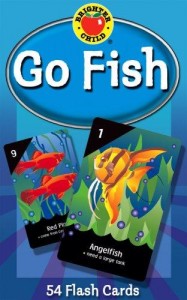 I like this Go Fish game especially because it has such broad appeal and utility. Our preschooler learns her numerals/quantities, our Core Phaser practices letter and word recognition and our Love of Learner/Young Scholar kids enjoy the little factoids about each fish that are on the cards. They can all play together and glean different things, while having a pleasant medium to help the younger ones with the skills they're most interested in working on right now. Plus everyone loved the exotic and beautiful illustrations on the cards.
I like this Go Fish game especially because it has such broad appeal and utility. Our preschooler learns her numerals/quantities, our Core Phaser practices letter and word recognition and our Love of Learner/Young Scholar kids enjoy the little factoids about each fish that are on the cards. They can all play together and glean different things, while having a pleasant medium to help the younger ones with the skills they're most interested in working on right now. Plus everyone loved the exotic and beautiful illustrations on the cards.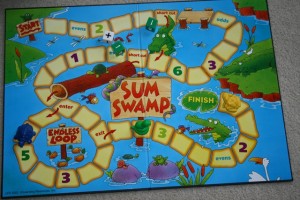 I'm recommending this one because so many of my friends have enjoyed it, although we don't actually own it. It's highly rated on amazon, as well. It's a simple addition/subtraction game for very young players.
I'm recommending this one because so many of my friends have enjoyed it, although we don't actually own it. It's highly rated on amazon, as well. It's a simple addition/subtraction game for very young players. Number balance
I love this toy because it helps to reveal number values, help with understanding of the number line, negative numbers, additive inverses, the associative principle of addition, the relationship between factors and products, etc.
Number balance
I love this toy because it helps to reveal number values, help with understanding of the number line, negative numbers, additive inverses, the associative principle of addition, the relationship between factors and products, etc. Dominos
Sooo many great games and learning activities are facilitated by a nice set of dominos! Number grouping, equivalents, less/greater than, simple quantity recognition, etc. Plus, who doesn't like a good game of chicken foot?
Dominos
Sooo many great games and learning activities are facilitated by a nice set of dominos! Number grouping, equivalents, less/greater than, simple quantity recognition, etc. Plus, who doesn't like a good game of chicken foot? Tangrams are a learning tool that combines artistic and mathematical elements to enhance visual perception ability, develop problem solving skills, creative thinking capacity and teamwork. The classic tangram forms a square. The 7 pieces can also form an infinite number of abstract designs, human figures, animals and everyday objects. The object is to form the image on the card using all seven puzzle pieces.
Tangrams are a learning tool that combines artistic and mathematical elements to enhance visual perception ability, develop problem solving skills, creative thinking capacity and teamwork. The classic tangram forms a square. The 7 pieces can also form an infinite number of abstract designs, human figures, animals and everyday objects. The object is to form the image on the card using all seven puzzle pieces. I like this Go Fish game especially because it has such broad appeal and utility. Our preschooler learns her numerals/quantities, our Core Phaser practices letter and word recognition and our Love of Learner/Young Scholar kids enjoy the little factoids about each fish that are on the cards. They can all play together and glean different things, while having a pleasant medium to help the younger ones with the skills they're most interested in working on right now. Plus everyone loved the exotic and beautiful illustrations on the cards.
I like this Go Fish game especially because it has such broad appeal and utility. Our preschooler learns her numerals/quantities, our Core Phaser practices letter and word recognition and our Love of Learner/Young Scholar kids enjoy the little factoids about each fish that are on the cards. They can all play together and glean different things, while having a pleasant medium to help the younger ones with the skills they're most interested in working on right now. Plus everyone loved the exotic and beautiful illustrations on the cards. I'm recommending this one because so many of my friends have enjoyed it, although we don't actually own it. It's highly rated on amazon, as well. It's a simple addition/subtraction game for very young players.
I'm recommending this one because so many of my friends have enjoyed it, although we don't actually own it. It's highly rated on amazon, as well. It's a simple addition/subtraction game for very young players.For older kids, try these:
- The Magic Tree House series (and the non-fiction companion volumes)
- The Magic School Bus series (The link there takes you to the "Human Body" set, which includes a life-size poster and stickers. And it's just plain amazing to go into a beehive with the Frizz and the kids!! These products are really cost-effective and SOOO worth the time invested. Lots of details, so they bear returning to again and again; classic!)
- The Fantastic Voyage, I & II, Asimov (great for learning anatomy)
- George's Secret Key to the Universe & George's Cosmic Treasure Hunt (by Stephen Hawking and his daughter; also available on audio book - great, not-dumbed-down intros to the universe)
- Theory of Everything video by Stephen Hawking
- Popular Mechanics for Kids video series
- How Stuff Works
- The University of Nottingham has a series of videos on each element in the periodic table!!
- Insect Lore (order insect larvae for metamorphological observations. That means to see what's inside.)
- Giant Microbes (order stuffed "animal" microbes. You can toss them around and "catch" polio or strep. Ew. Cool!)
Our science program is pretty basic right now. We read, we have a microscope and telescope, some magnifying glasses, pipettes and beakers, and I have just put up some posters in the bathroom detailing the brain, teeth, and ulcers (gross, but it was on sale!). We also have some big, heavy encyclopedias of Mammals, Ocean Life, Birds, and Dinosaurs that the bookstore was selling by the cash register for $7.99 apiece. We are into anatomy right now, so we have girl and boy 5-layer puzzles by beleduc.
Also, I don't know where I got these, but I really like Janice Van Cleave's stuff:
TTFN
I have lots more I want to download to you, but if I don't get this out it will be a waste, as you will have already bought your resources for the season. Got to get back to "doing school" this morning. xoxo rd*More full disclosure: Amazon pays TJEd a portion of their profits when you purchase on their site after being redirected there from any of these book links. There is no change in your cost, but TJEd benefits! Thanks ever so much for your support.
Guess what we did??
We invited 100 homeschoolers of every stripe to have a look at our This Week in History subscription, and we couldn't have been more tickled about their response! 100 out of 100 gave a very favorable review.
Here's a sampling:
Nicole said:
"I just don't know how this resource could be any better. It is so fun to get this e-mail each week and look at the plethora of suggested activities. And they are RELEVANT which is exactly how I like to teach!!"

Hope said:
"Our whole family has enjoyed This Week in History from TJEd.org. There are many beautiful photographs and illustrations that keep little (and big!) eyes engaged. The content has always been appropriate and inspiring.
"I am thankful to have the opportunity to expose my family to the well-researched topics in TJEd.org's This Week in History. It is a wonderful, ready to go, quality resource waiting for our family to use.
"We also enjoy the author including personal touches in various lessons, such as adding 'this is a place' she grew up, personal favorite literature books, and so on. Those comments bring the content down to a personal level and provide a connection to the author that we enjoy.
"We have found some lessons are easier for older students to grasp, some seem geared more for younger students, but they are all adaptable and enjoyable for any age group.
"Do take a peek into the sample weeks provided by TWIH. There's no way I could explain any better than one actually seeing and exploring the product on one's own."
Jan said:"Topics covered using "This Week in History" include math, science, language skills, geography, current events, the arts, and much more. All subjects covered are tied to events in history. And there's no need to worry that the subject you'd like to study won't be available for the week you need it; you can search by date, topic or keyword to find exactly what you're looking for.
"This is somewhat similar to a today-in-history calendar, but it's really different than any resource I've come across in my years of homeschooling. I started digging around the website right away and I was pretty impressed right from the get-go.
"I found a TON of ways to incorporate TJEd.org into our homeschool easily - and ease is pretty key to maintaining my sanity, I've come to find out!
"In fact, this resource completely fulfills a request of my husband's from a few years back. He wanted me to find a way to eliminate 'down time' when our children's assignments were done, but didn't want to fill that time with busy work.
"His idea was for me to create a binder with activities, reading lists, etc. for the kids to use. I started said binder, but alas my roles of wife-mom-homeschooler-to-five-children-and-all-the-rest stopped me from completing this task. Thomas Jefferson Education makes that idea a solid reality...and it does it with NO extra planning on my part."
Debbie said:"I've seen a lot of calendars with a "this day in history" feature. We've had printed ones that hung on our wall for a year. Sometimes, we would actually remember to look at them and read the event for the day. I've seen others online. Generally, they are a single fact or two. Kind of interesting, but we read them and move on.
"Initially, I thought that Thomas Jefferson Education's 'This Week in History' would be the same. Well, I was wrong. I think I've found something that we'll stick with!
"A subscription to 'This Week in History' allows the user to access the weekly information online or in weekly emails. I like the email format because, with the information in my inbox, I'm less likely to forget about using it.
"Each weekly email includes a colorful article for each day of the week. The articles are accompanied by links to additional information, craft and activity ideas, and so on. There is honestly almost enough here for it to be a full unit study curriculum!"
Lizzie said:"This week in history is accessible either on the website or in your inbox as an email! Super convenient and easy to use. I am from a history geek family, so I really enjoy reading the emails and seeing what was happening on that day.
"Often as I read the email, I share with James what event happened that day in history and show him some of the photos or check out the links.As we get into the swing of full time school this fall, I'm looking forward to using it to enhance areas we're currently studying as well as to add in some fun projects.
"Each day is like a unit study already put together for you. Many days include a few links or ideas but many of them include a ton of links and resources. I appreciate having them ready to go so that all I have to do is pick and choose.
"As I read through the emails, I'm impressed with the level of detail and work involved in preparing this resource. It's full of links and ideas. The email is not 'chintzy'.
One of the great things about this resource is that the work is all done for you. Each week features the story and an explanation as well as photos, topics to discuss, links to further information or ideas for projects. All I have to is click, read, and plan which activities to highlight that week. Easy peasy!"

This Week in History is a daily resource that brings your home school or classroom to life!
Whatever you want to learn, whatever there is to teach, it starts with history!
With a subscription to This Week in History, each day's resources are an adventure in math, science, language skills, geography, current events, the arts and so on - all tied to events in history.
For just $9.99 per month, you have the world of learning available to help you lead and inspire your students to explore, learn and and excel!
This Week in History is provided as a weekly online bundle of resources that you can access in either of two ways:
- On the dedicated TWIH blog feed at TJEd.org
- Via an email sent directly to your inbox using our secure email service
- relieves fear, stress and burnout
- energizes your kidschool
- fills in the gaps
- cultivates cultural literacy
- facilitates state or provincial compliance
- correlates resources for co-ops, classrooms and family learning
- harnesses the power of technology in a classical leadership education
- harmonizes with Unschooling, Charlotte Mason, Montessori, Trivium/Quadrivium, IEW, eclectic, etc.
- delivers new ideas and areas of learning to you and your child
- instigates discussions and projects that expand wisdom and understanding
- connects the subject areas-from music to math, from geography to world religions, from hobbies to science projects, etc.
- motivates you and your students to greater excellence
- delivers Face to Face with Greatness
- empowers you to mentor your students in the classics
- enlivens the 7 Keys of Great Teaching
- activates Phases of Learning


